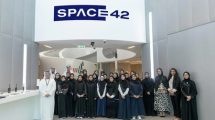 YahClick, the satellite broadband service of UAE headquartered Yahsat, has announced at CABSAT that it has won the Square Kilometer Array (SKA) project tender in South Africa. This will see YahClick delivering voice and data services in the country’s Northern Cape at a dramatically reduced cost and with a high level of reliability.
YahClick, the satellite broadband service of UAE headquartered Yahsat, has announced at CABSAT that it has won the Square Kilometer Array (SKA) project tender in South Africa. This will see YahClick delivering voice and data services in the country’s Northern Cape at a dramatically reduced cost and with a high level of reliability.
The SKA is an international initiative to build the world’s largest radio telescope, which will enable astronomers to monitor the sky in unprecedented detail, thousands of times faster than any system currently in existence.
The Northern Cape’s remoteness and lack of radio signals in the area made it one of the best locations in the world
to build the SKA. However, the associated protection requirements imposed by the Astronomy Geographic Advantage (AGA) Act demand that telecommunication services need to be delivered in a ‘radio astronomy friendly’ manner. These restrictions provided the perfect opportunity for YahClick to pursue its vision of connecting remote and underserved communities to each other, so it was seen as the natural fit.
YahClick’s ability to operate over Ka-band, enabling it to meet this highly demanding requirement, is understood to have been a key factor in the winning of the tender. YahClick’s Ka-band technology makes use of “spot beams” rather than broadcasting over an entire continent, which results in far more efficient use of the available bandwidth, at a lower cost. It is highly reliable and is not subject to terrestrial related factors out of the subscriber’s control which are common in African markets.
David Murphy, Chief Commercial Officer of Yahsat said: “For Yahsat to be winning prestigious and high profile international contracts such as the SKA is a remarkable achievement for a UAE company, especially given that the YahClick service is less than three years old. In that short space of time, it has become a global business, signing up 34,000 subscribers in 12 different countries, working with a growing network of service partners and establishing itself as a force to be reckoned with in a highly competitive market. This success is a great testament to Yahsat’s ambition, innovation and technical skills, for which the UAE as a whole is becoming increasingly renowned.”
Murphy added: “South Africa and the African continent is an important market for us and we were proud that our YahClick service was chosen as the technology of choice to provide the SKA communities with the ability to stay connected. Our technology allows us to deliver not only broadband internet, but also high quality voice, CCTV and a number of associated products such as email, backup and security. We believe that this service will significantly benefit the regions’ rural communities, farmers, and small-to-medium size businesses. This is entirely consistent with our main objective of connecting communities affordably, especially in more rural and underserviced areas where it truly makes a difference to lives.”
The SKA has sponsored an initial 300 terminals which are currently being distributed to the local community on a first come first serve basis.
YahClick satellite broadband service was named Best Satellite Provider in Africa at SATCOM 2014. Its internet and voice services are currently used on a daily basis at more than 4500 locations throughout South Africa, with more than 3000 from the agricultural and tourism industry.
The Square Kilometre Array Organisation awarded a large portion of the final SKA project to South Africa and its eight African partner countries. The balance of the development will be hosted by Australia and New Zealand.
With a start-up cost of £500million, the giant telescope will collect in a year more than 70 times the amount of information that moves across the Internet in a 12 month period. Construction on the SKA will start in 2017/18, with some elements operational by 2020, and full operation under way in 2025.













Add Comment